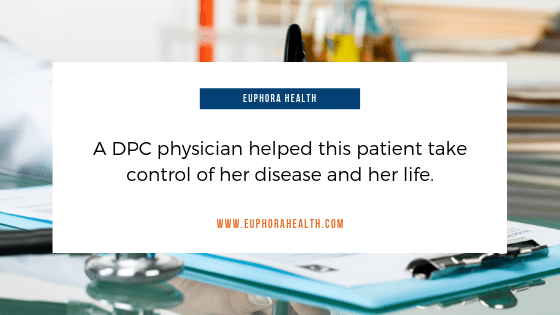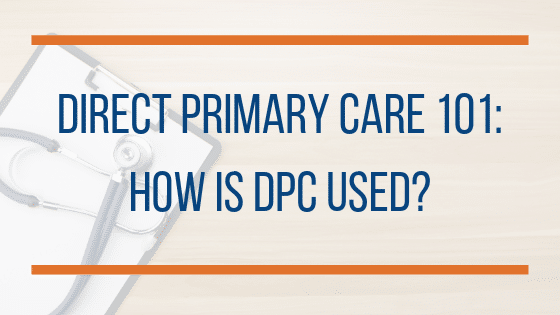Many patients who are new to the idea of Direct Primary Care (DPC) wonder, When and how would I use DPC? Give me some concrete examples. Since DPC is unique and differs significantly from insurance-based care, this question is worth digging into. In this two-part series, we’ll share some stories that illustrate how patients use DPC, and how a close bond between a DPC care provider and a patient can lead to lower costs, more efficiency, and better health outcomes.
In part one, we examined how the DPC model positions your doctor as your advocate and your personal healthcare expert, especially at times when you need quick care. Part two takes a close look at how Direct Primary Care can improve outcomes for chronically ill patients and individuals who need specialized care.
Check out part one for how DPC is different for routine and acute healthcare needs.
DPC for Chronic Health Needs
Direct Primary Care can be a powerful tool for chronically ill patients, in large part because DPC physicians develop a close understanding of their patient’s medical history over time. DPC can help patients manage chronic health problems such as hypertension, diabetes, hypothyroidism, high cholesterol, and more. DPC providers may even be able to help their patients reduce their medications and become healthier over time by coaching them on managing their diseases.
This story is a perfect illustration of the power of DPC for chronically ill patients. One patient, a diabetic female in her 60s, came to Euphora Health after researching Direct Primary Care. She lived about 50 miles away from the office, and at the time of her first visit, she had been living with uncontrolled diabetes for two years. Because traditional appointments were too expensive for her to afford, she had been off her medication. Although her prescription cost only $4 to fill, she couldn’t afford the necessary appointments to renew her prescription, leaving her to suffer dangerously high blood sugar levels.
After her first visit at Euphora Health, she had 14 points of contact with her DPC provider over the next four months. Because of the patient’s age and distance from the office, many of these points of contact were phone calls: her care provider spent 20-30 minutes at a time on the phone, consulting with her and giving her advice about diet and medications, listening to her concerns and providing care. During this time frame, the patient’s blood sugar levels plummeted from the low to mid 300s to the low 100s: in essence, she went from being at risk of going to the emergency room any day to having a well-managed, livable treatment plan.

As the patient developed a relationship with her care provider and learned more about how her blood sugar responded to particular foods, she was able to start reducing her dependence on medication through lifestyle changes, all with the careful coaching and assistance of her physician. A DPC physician helped this patient take control of her disease and her life.
DPC for Rare and Specialized Health Needs
Not all health issues fall into the “acute” or “chronic” categories neatly: some are better categorized as rare or specialized. In these instances, DPC can be an enormous asset to a patient for personalized care.
Have you ever had a health concern that you and your doctor just couldn’t get to the bottom of? Maybe you went in with vague and disconnected symptoms, and your doctor referred you to a specialist, who sent you home with an expensive bill and not many answers. Insurance-based care, as we’ve discussed before, can create unintentional barriers between care providers and patients, such as the high cost for exams, that make investigating a rare or confusing health issue difficult.
Here’s a story that demonstrates the DPC difference for rare and unusual health issues as well. An adult female patient came in for an appointment, complaining of poorly defined symptoms. She was experiencing bruising and pain throughout her body, pain in her gums, and stomach distress. Her DPC provider began the investigation, testing for autoimmune disorders and other potential causes. The results were inconclusive. Rather than referring her out for a specialist to examine her—someone without knowledge of her health history and who would send her home with another bill to pay—her provider continued pursuing the issue, researching, consulting with experts, and bringing the patient back in for more (low-cost or no-cost) tests and exams.
Finally, the light-bulb moment came and her care provider connected the dots. The patient was also suffering from an eating disorder, and because of her diet’s nutritional lack of Vitamin C, she had developed a rare case of scurvy. It was the first time this physician had ever made a scurvy diagnosis, as the disease is now incredibly rare. Because her care provider was able to spend more time on her specific issue and have close contact with her, she was able to receive a definitive diagnosis and appropriate care.
DPC for Specialized Care
In the instances when a specialist’s expertise is needed, a DPC physician can help. At Euphora Health, we pay for a service that allows for a formalized “curbside consult.” The term curbside consult was coined long ago, back when a primary care physician would visit their patient whenever they were hospitalized or in the care of a specialist. During these hospital visits, a primary care physician would pull up to the doctor’s parking lot curb and often discuss shared patients with, for instance, their patient’s cardiologist. These consults offered invaluable information sharing and expertise for both the specialist and the primary care physician: working as a team, they could provide better care for their shared patient.
In today’s modern healthcare environment, this curbside consult doesn’t exist anymore. Instead, traditional primary care physicians refer their patients out to specialists who they don’t communicate with directly. Direct Primary Care can make that old-school curbside consult a reality again with some unique services.
At Euphora Health, we use a service that provides virtual curbside consults. Our providers can use as many consults with a specialist as they need, sending pictures, X-rays, lab test results, EKGs, and notes, and then ask the specialists questions about the patient’s issues. Many times, this consult can eliminate the need for the patient to go outside of Euphora Health for their specialty care, keeping costs down and increasing efficiency.
If the patient does end up needing a referral, the resulting appointments and care is much more efficient and personalized. The patient will visit the specialist’s office armed with more information, reducing the number of visits they’ll need and eliminating redundant tests or exams. The local specialist will have an easier time reaching a conclusion and providing care.
DPC Makes a Difference
Direct Primary Care is different—because of the close relationship between doctor and patient, we can reduce costs, mistakes, and redundancies. The upsides of working with a provider who knows you well cannot be stressed enough. The more care we can keep in-house with your primary care provider, the better the outcomes and the safer patients are. We’re proud to support our patients through all of their healthcare problems and needs, whether they’re suffering from an acute and urgent issue, a chronic disease, or a special case.
Still have questions? Call us today to set up a consultation. We’re happy to help.
Check out part one for how DPC is different for routine and acute healthcare needs.

